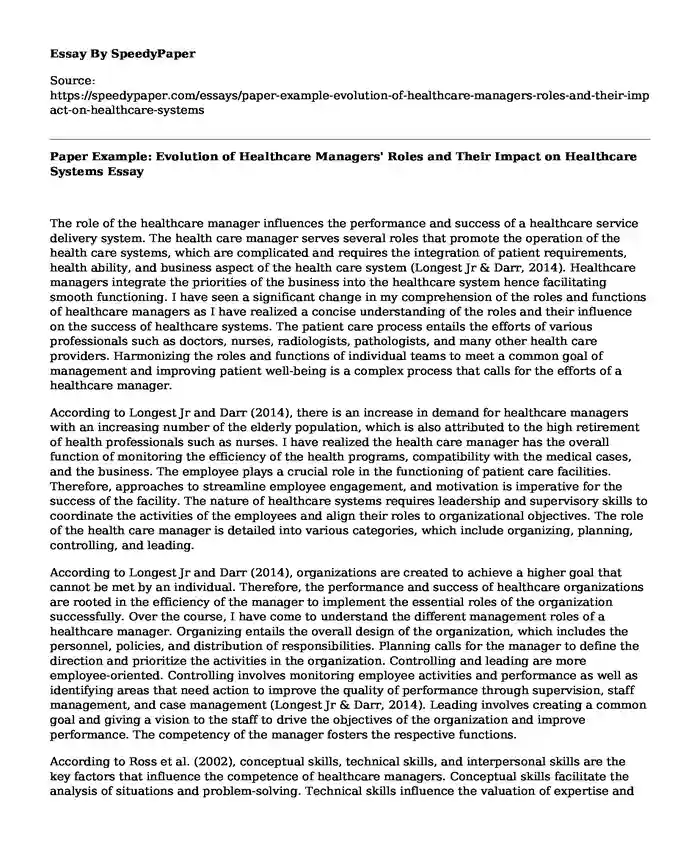
| Essay type: | Reflective essays |
| Categories: | Management Healthcare |
| Pages: | 3 |
| Wordcount: | 643 words |
The role of the healthcare manager influences the performance and success of a healthcare service delivery system. The health care manager serves several roles that promote the operation of the health care systems, which are complicated and requires the integration of patient requirements, health ability, and business aspect of the health care system (Longest Jr & Darr, 2014). Healthcare managers integrate the priorities of the business into the healthcare system hence facilitating smooth functioning. I have seen a significant change in my comprehension of the roles and functions of healthcare managers as I have realized a concise understanding of the roles and their influence on the success of healthcare systems. The patient care process entails the efforts of various professionals such as doctors, nurses, radiologists, pathologists, and many other health care providers. Harmonizing the roles and functions of individual teams to meet a common goal of management and improving patient well-being is a complex process that calls for the efforts of a healthcare manager.
According to Longest Jr and Darr (2014), there is an increase in demand for healthcare managers with an increasing number of the elderly population, which is also attributed to the high retirement of health professionals such as nurses. I have realized the health care manager has the overall function of monitoring the efficiency of the health programs, compatibility with the medical cases, and the business. The employee plays a crucial role in the functioning of patient care facilities. Therefore, approaches to streamline employee engagement, and motivation is imperative for the success of the facility. The nature of healthcare systems requires leadership and supervisory skills to coordinate the activities of the employees and align their roles to organizational objectives. The role of the health care manager is detailed into various categories, which include organizing, planning, controlling, and leading.
According to Longest Jr and Darr (2014), organizations are created to achieve a higher goal that cannot be met by an individual. Therefore, the performance and success of healthcare organizations are rooted in the efficiency of the manager to implement the essential roles of the organization successfully. Over the course, I have come to understand the different management roles of a healthcare manager. Organizing entails the overall design of the organization, which includes the personnel, policies, and distribution of responsibilities. Planning calls for the manager to define the direction and prioritize the activities in the organization. Controlling and leading are more employee-oriented. Controlling involves monitoring employee activities and performance as well as identifying areas that need action to improve the quality of performance through supervision, staff management, and case management (Longest Jr & Darr, 2014). Leading involves creating a common goal and giving a vision to the staff to drive the objectives of the organization and improve performance. The competency of the manager fosters the respective functions.
According to Ross et al. (2002), conceptual skills, technical skills, and interpersonal skills are the key factors that influence the competence of healthcare managers. Conceptual skills facilitate the analysis of situations and problem-solving. Technical skills influence the valuation of expertise and suitability for a particular role. Interpersonal skills are vital in enhancing a working relationship between the management team and subordinates as well as among employees (Ross et al., 2002).
Conclusion
In conclusion, I can ascertain that my understanding of the roles of the health care manager has changed with a broader view realized on the internal and external roles that enhance employee engagement, motivation, and satisfaction as well as overall patient satisfaction. The management functions include planning, organizing, controlling, and leading, which are linked to conceptual, technical, and interpersonal skills to attain the smooth functioning of the organization.
References
Longest Jr, B. B., & Darr, K. J. (2014). Managing Health Services Organizations and Systems (MHSOS). Health Professions Press, Inc.
Ross, A., Wenzel, F. J., & Mitlyng, J. W. (2002). Leadership for the future: Core competencies in healthcare. Health Administration Press.
Cite this page
Paper Example: Evolution of Healthcare Managers' Roles and Their Impact on Healthcare Systems. (2023, Nov 07). Retrieved from https://speedypaper.com/essays/paper-example-evolution-of-healthcare-managers-roles-and-their-impact-on-healthcare-systems
Request Removal
If you are the original author of this essay and no longer wish to have it published on the SpeedyPaper website, please click below to request its removal:
- Nutrition Essay Example from Our Collection
- Free Essay. Psychiatric and Mental Health Nurse Practitioner in Georgia
- Free Essay: How Social Media Contribute to Anxiety and Depression
- Essay Example. The New York Nurses Association's Position on Abortion
- Darkness by Lord Byron. Paper Example
- Paper Example on Mental Retardation & Death Penalty: After Atkins
- Types of Conflict - Free Paper Sample
Popular categories




